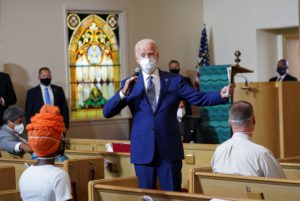President Biden Visits Wisconsin to Discuss Bipartisan Infrastructure Plan
On Tuesday afternoon, President Joe Biden visited Wisconsin to pitch his nearly $1 trillion dollar infrastructure deal made by a group of bipartisan senators after weeks of negotiations. The president called the deal a “generational investment” that would ultimately help make structurally insufficient bridges, roads, aged water lines and bolster the nation’s energy grid.
“America has always been propelled into the future by landmark national investments,” Biden said. The president’s appearance in La Crosse, WI, transpires as the White House tries to navigate the dissension between Democrats on Capitol Hill over how to proceed with passing the infrastructure bill and securing enough votes from Republicans in order to vaunt bipartisan support.
“After months of careful negotiation — of listening, compromising together and in good faith moving together, with ups and downs and some blips — a bipartisan group of senators got together and they’ve forged an agreement to move forward on the key priorities of my American Jobs Plan,” Biden said as he addressed the crowd. “This is a generational investment, a generational investment to modernize our infrastructure, creating millions of good-paying jobs… and positions America to compete with the rest of the world in the 21st century, because China is way outworking us in terms of infrastructure.”
In his speech, Pres. Biden for the first time told the American people his support of the bipartisan infrastructure proposal after the entire plan almost completely derailed until during talks last week both sides finally came to an agreement. He also praised the bipartisanship of the proposal, stating that it is a “signal to ourselves and to the world that American democracy can come through and deliver for all of our people. We can be united.”
While highlighting different elements of the plan, Biden spoke on the safety aspect of his plan. He noted that the US has one of the highest driving fatality rates in the industrial world. After momentarily pausing, Biden said, “I lost a wife and daughter and almost lost two sons…I bet every one of you here can tell me what the most dangerous intersections in your town are.” Biden lost his first wife and infant daughter in a car accident in 1972.
Pres. Biden also emphasized the deal’s investments to replace lead pipes across the country. “This deal contains the largest investment in clean drinking water and wastewater infrastructure in American history,” he said. This part of the plan specifically benefits those in Wisconsin, which would replace all of Milwaukee’s lead water service lines, make improvements to 1,000 bridges in Wisconsin that have structurally deficient ratings, and bring high-speed internet to over 82,000 children in the state who do not have reliable internet access at home. Lastly, he touted how the plan will distribute over 35,000 electric busses for school districts and implement half a million charging stations for electric vehicles nationwide.
The president also reiterated his dedication to fully delivering on his American Families Plan. The proposal includes numerous Democratic and progressive priorities that would largely invest into paid family leave, education, and childcare. “The human infrastructure is intertwined with our physical infrastructure. It’s going to help us create more good jobs, ease the burden of working families and strengthen our economy in the long run,” he said.
He continued, “I’m going to be out there making the case for the American people until this job is done, until we bring this bipartisan deal home, until our human infrastructure needs are also met, until we have a fairer tax system to pay for all of this.”
As of right now, the fate of the infrastructure bill remains uncertain. A group of 11 GOP senators have agreed to support the bipartisan infrastructure plan; however, it is still unclear if they will stand by it. Sen. Lindsey Graham (R-SC), one of the 11 senators who’ve signed on, warned that he will vote against the bill if Democrats hold up the process to get reconciliation on its framework.
[si-contact-form form=’2′]


